Random Reviews: Daytripper
Let the endings of one man's life encourage you to live yours
—by Nathan on September 2, 2023—
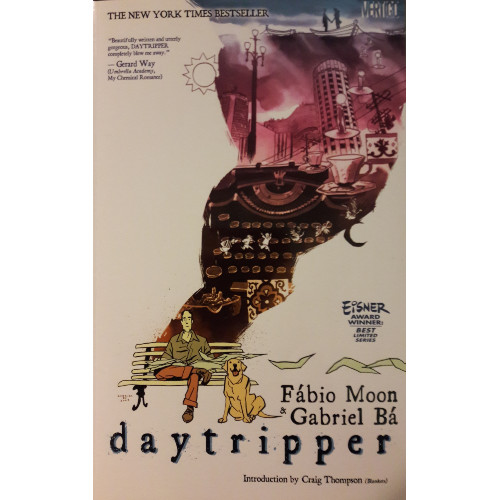
If you peered through the second of two scrapbooks my mom made me, furnished with frozen memories of my formative years, you’d find a photo of my sister and me reading Daredevil #164, the Frank Miller-illustrated retelling of Horn-Head’s origin (Miller would later do his own written retelling of DD’s early days in his Man Without Fear limited series, an excellent narrative illustrated by the always-impressive John Romita Jr., but I digress). The picture is not dated, but it’s positioned with other photos encompassing Spring/Summer 2003, right before the August 2003 birth of my youngest sister. I don’t recall reading the comic, but I do remember buying the Ben Affleck-modeled Daredevil action figure it came with.
I couldn’t tell you, either, if this was the first issue I browsed–that honor may go to a Fantastic Four issue written and illustrated by John Byrne packaged with a Thing action figure I gave my dad for Father’s Day one year (which subsequently found its way into my action figure bin…wonder how that happened). My first real memory of reading comics, as I’ve noted elsewhere, comes from my first family vacation to Florida in 2004; shortly thereafter, I dove into the Stan Lee/Steve Ditko era of Amazing Spider-Man…and haven’t stopped diving.
For the past twenty years, I’ve been hooked on comics and graphic novels, poring over literally hundreds of Spider-Man issues, a small sampling of which I’ve painstakingly reviewed the last three years. But I’ve grown in my love for other characters as well–the X-Men, Thor, Black Panther, and the aforementioned Daredevil to name a few–and taken glimpses into the less-illuminated corners of Marvel’s expansive treasure trove of heroes. I’ve even drifted over to the “darkseid,” if you will, and scrounged together some fragments of the DC Universe (Batman: The Long Halloween remains my favorite ever work of graphic literature, and Mark Waid’s Superman: Birthright may be a close second favorite DC Comics narrative). The collection has accumulated much since that first plane trip to Florida, and I’ll happily continue exploring the widening Marvel and DC universes as best I can.
Yet within the last year or so, primarily since December of 2022, I’ve been prompted and encouraged to widen my gaze beyond the Big Two. Much of this nudging has come from my involvement with Geeks Under Grace; I’ve done my due diligence to Marvel and DC both, staring deeply into Civil War, Old Man Logan, Batman: Earth One, and Flashpoint, among others, but I’ve been inspired at points to soak in other narratives: Grant Morrison and Frank Quitely’s WE3; Brian K. Vaughan’s Pride of Baghdad; Norm Konyu’s The Junction; Donny Cates’ God Country. When a friend asked me late last year if I had ever read Robert Kirkman’s Invincible, I replied I hadn’t…and immediately set out rectifying that oversight.
Oh, sure, non-Big Two comics, even non-superhero comics, have fluttered across my radar previously. Among my absolute favorite series is Jeff Smith’s Bone, a comedic yet epic saga I was first sucked into at least fifteen years ago. But as I’ve gotten older, and as I’ve hopefully matured, my tastes have started…not “changing”...perhaps adapting? Evolving? I’ve never lost the love for superhero fare–give me a bombastic cosmic slugfest like Infinity Gauntlet or Crisis on Infinite Earths any day–but reading only superhero fare all the time leaves out a lot of good material, a lot of stories I wouldn’t otherwise examine or give myself the chance to appreciate.
So I’m trying an experiment. I want to periodically post something random, a non-Marvel/non-DC review on a story, series, or volume that, for whatever reason, I’ve decided to read but not write about for Geeks Under Grace. My other blogs have had some strings attached or conditions under which I’d write; not here. These will truly be as the title states: random reviews of graphic novels and series not primarily connected to any Marvel or DC story I write about. Sure, overlap may exist here and there–I’ve got a series illustrated by Romita Jr. that I picked up solely because I love his work with Marvel, for example–but these are otherwise completely random.
Perhaps the one exception will be volumes I collect published by Vertigo, a now-defunct DC imprint. Over the years, Vertigo has produced series and graphic novels (such as WE3, Pride of Baghdad, and Daytripper) not affiliated with (as far as I can tell) any DC Universe, but they’ve also created content (Hellblazer, Swamp Thing, The Sandman, etc.) which is more ingrained within the overarching DC pantheon. Since I’m hoping to post on some of those non-affiliated narratives, such as this Daytripper review, I’m lumping every Vertigo review I write into this “Random Review” category. It just seems like it would keep things more streamlined.
These are stories I’ve either read or have wanted to read. They may be portions of longer series I have not fully collected, regardless of whether I intend to or not (such as Cerebus, Animal Man, or the aforementioned Sandman). They may be stories I picked up because they’re acclaimed or they may be a bit of a risk. Who knows?
(I mean, I know…I’m reading these things intentionally, right?)
Point is: this is a new direction for me, an attempt to continue broadening my options and understanding of the genre, gaining a deeper feel for this form of literature I’ve loved for so long, and expanding my appreciation in exploring stories, as I said, I would otherwise ignore.
To kick things off, I think it’s only right to discuss one of the best comics I’ve read in the last year. Not a Marvel comic. Not a mainstream DC comic. No capes or cowls, no superhumans or mutants, no gods of thunder or genocidal purple aliens…just a guy, living life.
Or maybe...“lives”?
Daytripper
Writers: Fábio Moon and Gabriel Bá
Pencilers: Fábio Moon and Gabriel Bá
Inkers: Fábio Moon and Gabriel Bá
Colorist: Dave Stewart
Letterer: Sean Konot
Issues Collected: Daytripper #1-10
Volume Publication Date: February 2011
Issue Publication Dates: February-November 2010
Publisher: Vertigo (DC Comics imprint)
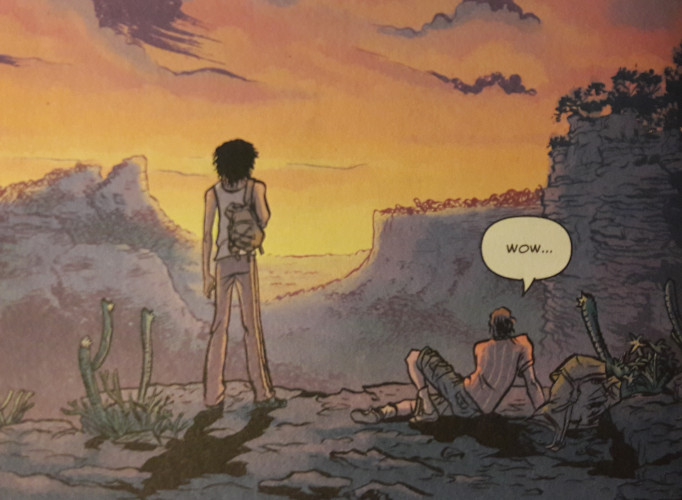
Written and illustrated by Fábio Moon and Gabriel Bá, twin brothers from Brazil, Daytripper follows the life (or lives) of obituary writer and novelist Brás de Olivio Domingos. Each issue features Brás at a different age–first 32, then 21, 28, 41, 11, and so on–and each issue ends with his death.
Yes, each issue, Brás dies…only to pop back up at the beginning of the next chapter.
This narrative mechanism is never fully explained–whether we’re witnessing a multiverse of many Bráses or whether this is just a very complex dream (which the final issue maaaaaay hint at if you want to squint and interpret it a certain way) or some other reason–but you’re not supposed to question the method. Just know that Brás will die at 11 years old, only to live until 33 the next issue, only to die again. Brás is not aware of these deaths, nor is there some supernatural element, like resurrection or the involvement of a deity. It’s a “What If-?” concept: “What if Brás died at this age here? But what if he lived a little longer, or not as long, there?” Just roll with it, because if you get caught in the seemingly supernatural trappings, you'll miss the important details.
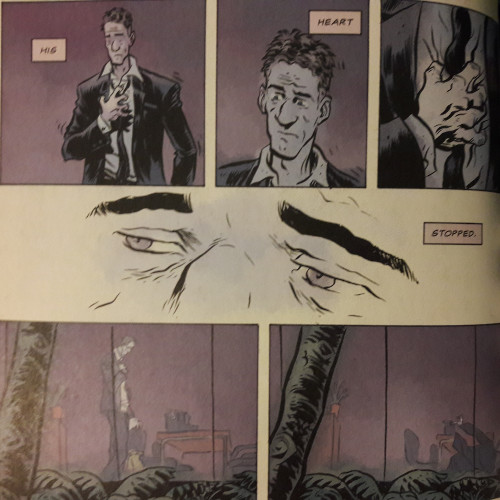
This structure allows the series to resonate deeply and set itself apart from other comic narratives as a marvelous feat of storytelling focused on the act of living. Daytripper could easily have become a dopey, sappy, hand-me-the-Kleenex-so-I-can-dab-my-eyes-and-blow-my-nose reflection on life, death, and all the minutiae in the middle. It could’ve slapped you in the face with vapid, sentimental statements about the beauty of the world or the fleeting miracle of life; it could’ve grabbed you by the shoulders and shaken you like a soda can, demanding you listen and do something with your existence, for crying out loud. Leave a legacy, darn it! Feel what the story commands you feel!
And, in a beautifully roundabout way, that is what Daytripper is about. The fragility of life, completed by passing into death. Knowing the inevitable is on the horizon and facing it, realizing it may come at any moment and that life, until its final days, is meant to be filled with purpose and meaning.
But it’s more than that, which I’ll touch on in a moment.
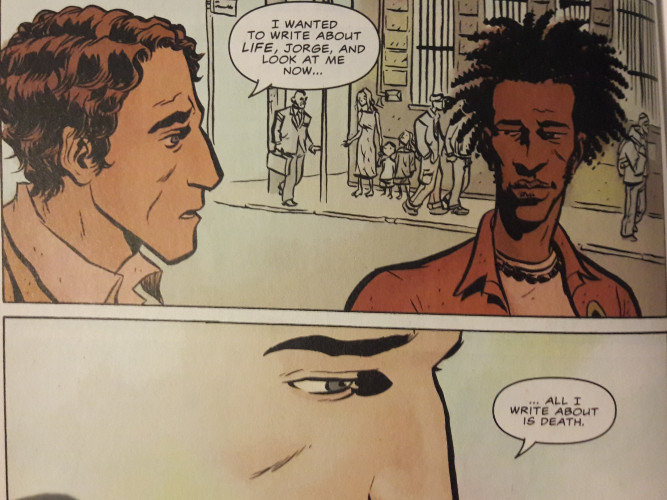
What keeps Daytripper from descending into what Henry F. Potter once described as “Sentimental hogwash!” is its focus on Brás. I’ve commented, liberally in real life, occasionally in my writing, that narratives which subvert storytelling for proselytizing messages or commentary, particularly ones which choke the reader, read poorly in my estimation. I like breathing, thanks ever so much. Daytripper largely avoids this; save for a few whimsical statements concerning the beauty of living, Moon and Bá refrain from overtly tethering their story to any real world analogues or directing the reader down a jarring, garish red carpet of trite commentary. Instead, we watch Brás work his way through life in stages, one piece at a time, and allow ourselves to see our lives through his experiences–what has been, is, and could have been.
The non-chronological structure of the story keeps you on your toes–you would expect, naturally, for a story to work its way from the earliest events to the latest, and though some chapters feel as if they succeed each other (for example, the issue where Brás meets his future wife occurs immediately after the issue where Brás meets his first love), most of the issues are laid out seemingly at random, though certainly structured intentionally. We don’t expect Brás to pop up as a precocious 11-year-old just on the cusp of learning about the world in the middle of the series, yet here he is.
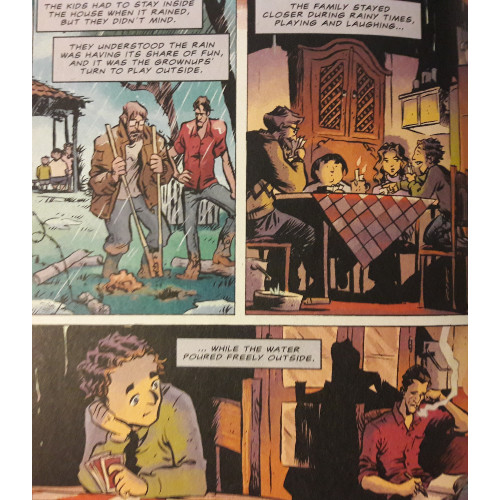
This non-linear telling allows each issue to stand out–there are no “filler” issues acting as bridges from one big event to the next. Each issue is important, each moment in Brás’ life (or lives) stands apart from the others, specifically because Brás’ life ends in each chapter. Again, logistics aren’t important (in other words, don’t question why Brás runs into his future wife after he dies before meeting her in the last issue), but each central event is. Each chapter slaps you in the face: Brás dies now. On his 32nd birthday. The day his son is born. The day he visits an estranged friend. After returning home from a family vacation.
Though you come to learn quickly Brás is destined to die in each issue, you’ll do yourself and the series a disservice if you read Daytripper as a twisted version of Groundhog's Day, where Brás is cursed to return, again and again, until he gets something right. That’s not the point. As you end each issue, you’re supposed to reflect on when Brás’ life ends rather than how he dies. What is left behind at each specific moment? What is lost when an 11-year-old boy accidentally touches an electric wire? What happens to his wife and son when Brás dies the same day his son is born? Indeed, what happens to his wife and son when Brás dies when his son’s a few years older? Or when Brás is on the brink of fame? Or when he’s already famous? Or at the very fringes of age, when death is less unexpected?
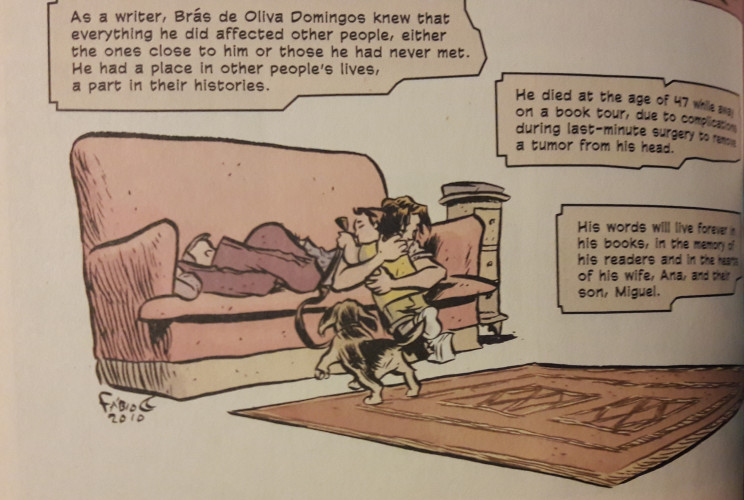
Despite the series’ occasional drift towards sentimentalism, nowhere are the brothers loquacious in providing self-application. That bit’s up to you. At its heart, yes, Daytripper asks that readers reflect on themselves, see their lives through Brás’ eyes, and wonder what they would leave behind were they to die right then and there (or, if they wish to challenge their imagination, project themselves into Brás’ different ages...what if you had died at 11, 21, 32?). A bit more deeply, readers should grapple with this concept of purpose and meaning, examining the fragile and unexpected timeline they balance along like a highwire, knowing any moment could lead to a fall, and determining to be intentional with the time they have.
When I first read Daytripper, this was my primary takeaway, and I loved it for the way it wonderfully promoted purposeful living without veering into senses-shattering symbolism. And, after a reread, I still enjoy its poetry.
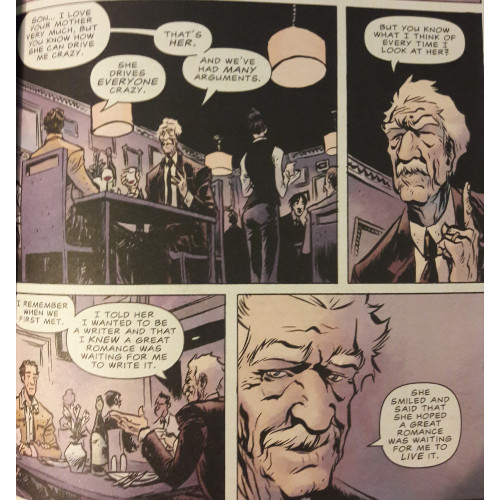
But there was something I missed that I caught on more immediately this time around: the ripple effect of Brás life. To quote It’s A Wonderful Life again, I'll allow guardian angel Clarence the stand: “Each man’s life touches so many other lives.” Daytripper readily explores Brás’ life (or lives) and what he misses out on or leaves behind at each stage, yet just as poignantly, touches on the impact his loss has on those around him. In a chapter devoted primarily to Brás’ wife and child, we’re given a glimpse into their anguish after learning of Brás’ passing, a churning sense leaving us aware their lives will be irrevocably altered in the unwritten years. We’re left with a similar sting when Brás’ sister is summoned from class shortly after her younger brother’s contact with the wire. Each chapter ends with an obituary–tethered, neatly, into Brás’ primary occupation, one of the details threaded consistently throughout the series–detailing the heartache each of Brás’ deaths leaves in its wake.
So, yes, rail against the injustice of Brás’ deaths, all too fleeting in most instances, but do not forget to mourn those he leaves behind. Their stories–a wife, a son, a mother, a father, a sister–aren’t as detailed as Brás’ own narrative, but they are informed and impacted by Brás’ unfolding stories. A wife without a husband. A son without a father. A sister without a brother. And parents without a son. For Daytripper is more than just about leaving a legacy to be cherished and remembered by for your own glory and personal stamp on history or society…it’s also about those who must carry that memory on their shoulders, sometimes tragically, sometimes far too early.
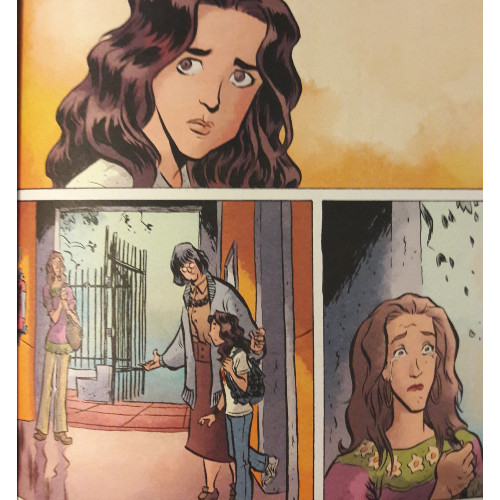
I feel like I’ve been drawn towards stories which elaborate on the “meaning of life” or some similar notion. I put that in quotes because I mean it in a broad sense, stories of individuals finding or reflecting on their purpose. God Country focuses on an older father given a second chance at redefining his legacy for his son and family; Green Lantern: Emerald Dawn shines a green spotlight on a man destined to make more of himself and rewrite a life marred by the consequences of personal scruples; even Pride of Baghdad showcases anthropomorphized animal protagonists, given voice, who only want to find their home, a place where they belong (see also: WE3). Maybe “drawn” is the wrong word. Maybe I’m just finding stories and happen to pick out that particular theme because it’s the theme I’m hoping I’ll find or feel more sensitive towards at the moment. Meaning, purpose, intention…what you build your life towards and how you decide to live it. That concept is the core of Daytripper. Who you are, who you become, what you leave behind.
It’s not an earth-shattering notion: if you’re not relating to Clark Kent discovering his purpose in Birthright, maybe you’re watching Mark Grayson become his own hero in Invincible or Peter Parker struggle with the daily juggling of responsibility and power. We want characters who feel like us. We witness characters find and fulfill their potential, use skills, make a difference, figure this whole messy life thing out…they strive to become something better than they were before, something different.
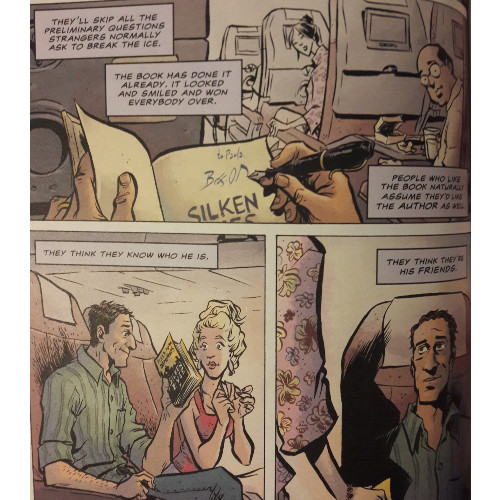
Brás de Olivio Domingos isn’t a superhero. He has no powers. He’s much like you and me. I don’t have to psychoanalyze how the deaths of his parents or uncle reshaped his perspective on the world and led him to don a gaudy mask and costume. We don’t have to strip away the layers to find what drives him and gives him meaning. In that way, he’s a tad easier to relate to, possible mystic occurrences which keep us dancing through his “lives” aside. I relate to Brás’ creativity and where he wants to use his talents, and I hope to have enough time to use my own well. But I don’t know. I can't know. I can hope...but I’m not aware of what tomorrow holds. And shouldn’t that help me decide who I am, who I’m becoming, and what I leave behind?
Life could end at any moment…but it begins whenever you choose.